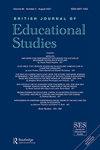为什么概念很重要,概念分析的目的是什么,以及知识在教育中的情况
IF 2.1
3区 教育学
Q2 EDUCATION & EDUCATIONAL RESEARCH
引用次数: 0
摘要
“知识”的概念是教育的核心,特别是当涉及到学校课程时。本文提出了在教育研究中从事概念分析,特别是概念工程的案例。概念工程强调分析概念的目的。为了说明这种概念分析在教育中的重要性,我追踪了三种知识概念对教育的影响:(1)传统的哲学知识概念是正当的,真正的信念;(2)迈克尔·杨的“权贵知识”概念;(3)杨的“强大知识”概念。我认为,知识是合理的,真正的信念是过于抽象的教育目的,不能提供太多的指导课程规划。杨的“权贵知识”优先考虑知识所能发挥的社会作用,而不是其对学生个人的价值。最后,“强大的知识”太不明确,无法为决策者和实践者提供适当的指导。通过研究这些知识概念与历史政策和教育实践之间的相互作用,我得出结论,概念工程对教育目的清晰度的关注是良好概念分析的核心。本文章由计算机程序翻译,如有差异,请以英文原文为准。
WHY CONCEPTS MATTER, WHAT CONCEPTUAL ANALYSIS IS FOR, AND THE CASE OF KNOWLEDGE IN EDUCATION
ABSTRACT The concept of ‘knowledge’ is central to education, particularly when it comes to the school curriculum. This paper makes the case for engaging in conceptual analysis, and in particularly conceptual engineering, in educational studies. Conceptual engineering emphasises analysing concepts with their purposes in mind. To illustrate the importance of this sort of conceptual analysis in education, I track the educational impact of three concepts of knowledge: (1) the traditional philosophical concept of knowledge as justified, true belief; (2) Michael Young’s concept of ‘knowledge of the powerful’; and (3) Young’s concept of ‘powerful knowledge’. I argue that knowledge as justified, true belief is too abstracted from educational purposes to provide much guidance for curriculum planning. Young’s ‘knowledge of the powerful’ prioritises the social role that knowledge can play over its value to individual students. Finally, ‘powerful knowledge’ is too unclear to provide appropriate guidance to policy makers and practitioners. By examining the interactions between these concepts of knowledge and historical policy and practice in education, I conclude that the focus of conceptual engineering on clarity about the purposes of education is central to good conceptual analysis.
求助全文
通过发布文献求助,成功后即可免费获取论文全文。
去求助
来源期刊

British Journal of Educational Studies
EDUCATION & EDUCATIONAL RESEARCH-
CiteScore
4.50
自引率
5.30%
发文量
36
期刊介绍:
The British Journal of Educational Studies is one of the UK foremost international education journals. It publishes scholarly, research-based articles on education which draw particularly upon historical, philosophical and sociological analysis and sources.
 求助内容:
求助内容: 应助结果提醒方式:
应助结果提醒方式:


